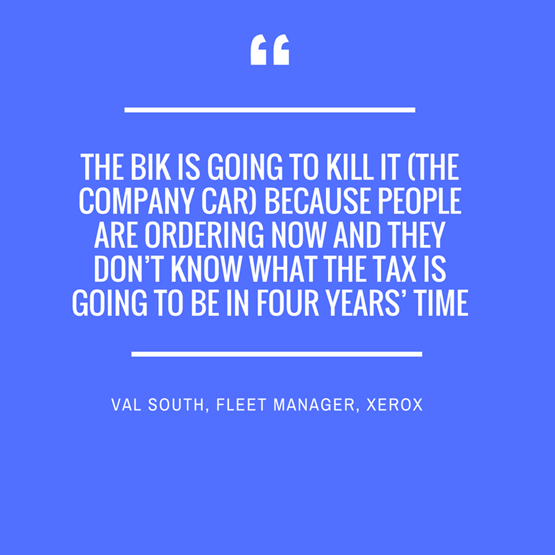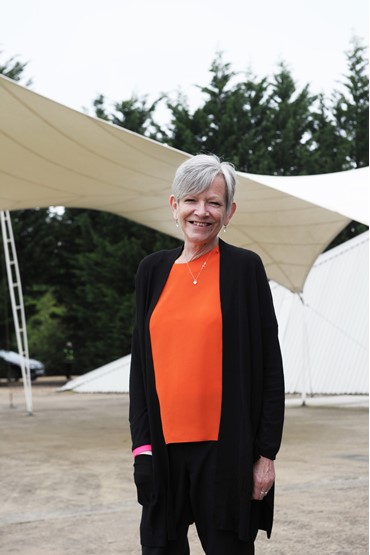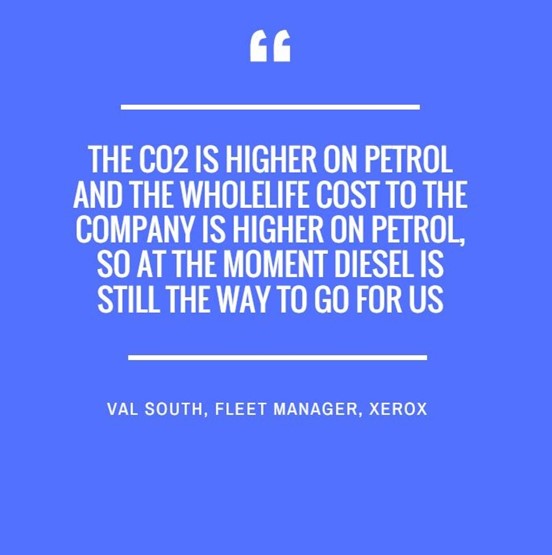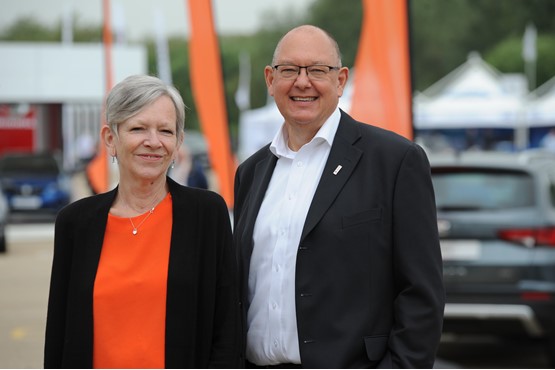Val South explains how Xerox has had to rethink its employee car ownership scheme as a result of last year’s new tax rules. Sarah Tooze reports
Back in 2005 Xerox launched an employee car ownership (ECO) scheme with “every manufacturer you can think of” on the choice list, according to GB fleet manager Val South.
The scheme, which ran alongside Xerox’s lease car policy, was designed to satisfy employees. In the process, it saved the company £1 million in the first three years.
All job-need drivers (those doing 8,500 miles a year or frequent business trips) moved across, while for perk drivers the best way to finance each car – ECO, lease, cash – was worked out on an individual basis.
When Fleet News last profiled the Xerox fleet in 2011 (following South’s entry into our Hall of Fame), there were 900 drivers in the ECO scheme, a couple of hundred in contract hire and 800 cash takers.
Today, it’s a different story. ECO is being phased out as a result of last year’s optional remuneration arrangement (OpRA) tax changes and the company car fleet has shrunk to 550 vehicles, with a further 450 staff taking the cash option.
The cut in the company car fleet happened prior to OpRA and was a result of a reduction in headcount and a new fleet policy in 2014, which was brought in as part of a cost-savings initiative.
“We were charged with taking 20% out of our fleet costs,” South says. “All countries (which Xerox operates in) had to do that and track it for four years.”
South has reduced the fleet spend from £8.5m in 2013 to £6.5m in 2017, with a further £1m reduction expected this year.
Partly this is due to the decrease in fleet numbers but savings have also been achieved through a number of measures: a European-wide manufacturer tender, which was awarded to the Volkswagen Group; reducing the car entitlement level (which lowered the level of the base car); removing discounts on the amount employees paid for the vehicle; and reducing the car allowance.
How did drivers react to the changes?

“Not great, they’d been so used to having a lot of choice,” South says.
“I think the fact it was the VW Group and there are four brands helped a little with choice, but because of all the changes we made we did have a number of people decide ‘no, I’m going to take the cash and do my own thing’.”
Since then, the fleet policy has had to change again, thanks to OpRA.
“OpRA has hit us quite hard,” South says. “The AMAP (approved mileage allowance payment) we used to offset the cost of the car ownership scheme was previously free of tax and NI (national insurance) and under OpRA it became chargeable to tax and NI.
“Also, it’s a double-edged sword as some of our drivers in car ownership also had the option of the cash allowance so they were caught under the OpRA regulation in terms of the tax they pay.”
Xerox decided to give any managers who were in the ECO scheme the option of returning their vehicle and moving to cash allowance or it being refinanced under a contract hire agreement.
As that meant breaking a private lease agreement between the employee and Xerox’s leasing provider Zenith, Xerox had to write to the drivers to explain the situation and Zenith had to send them a legal document to break the lease.
“It was about 50 people we had to do it for and it was quite a complicated process tracking down the paperwork and making sure people had signed all the correct documents,” South says.
“I had personal conversations with each of the 50 executives about their own specific case and what it meant to them and what their options were and what would be the best way to go.
“Clearly I can’t give advice on tax, I can only tell them ‘if you do this, this will happen’ so that’s been quite time-consuming.”
The response from the 50 employees was mixed. Some decided to return the car, some decided to buy it and others decided to transfer to contract hire and pay benefit-in-kind (BIK) tax.

Move to contract hire
The 131 job-need drivers have remained in the ECO scheme as it is too costly to break all of their personal leases, but, as soon as the cars reach the end of contract and are returned to Zenith, Xerox will move to contract hire.
As an interim measure, the employees will switch to a new type of car ownership scheme with a fixed monthly amount instead of variable one which will mean the employee isn’t impacted by the increase in tax.
This scheme has just been approved by HMRC which also advised Xerox on the tax arrangement for its cash allowance drivers.
It has been told that it must calculate the amount of cash foregone on an individual basis, resulting in more admin.
Further change is afoot as Xerox’s fleet policy is being reviewed internationally.
“Our compensation and benefit people are collecting data for all of the countries on all of the benefits to see what people offer on health schemes, pensions, car schemes and because of the whole WLTP (Worldwide harmonised Light vehicle Test Procedure) issue it’s all up for review as to what our CO2 levels need to be set at,” South says.
“We’re waiting for CO2 emissions to be known and then they can decide about policy.”
In the UK, Xerox has CO2 caps of 120g/km and 130g/km, dependent on management level.
Average fleet emissions are 95g/km on NEDC testing because Xerox’s job-need car used by its engineers is an Astra estate, which has emissions of 89g/km.
South is adamant that Xerox will not raise its CO2 caps as a result of WLTP.
“We’re going to have to find cars that exist that fit within our current CO2 policy,” she says. “It could bring entitlement levels down, we don’t know until that data is available.”
South is informing employees about WLTP as and when their cars are due to be replaced, but is experiencing problems with vehicle availability.
“The biggest problem we’ve got at the moment is you can’t order cars from some manufacturers because they’ve taken them off the quoting list while they test. So I’m getting a backlog of orders,” South says.
“People are going onto the choice list and saying, ‘well, I looked last month and I could choose from 100 cars and now there are only 10’ because a lot of the models have been taken off while they test them so that, in itself, means we’re having to extend leases beyond their normal replacement date which could have an on-cost if you’re running high mileage, older cars.”
South has advised employees that if they wait for cars to come back on the choice list they must be prepared that the amount of tax they pay could go up if the vehicle’s CO2 emissions rise as a result of WLTP.
Those that have already placed orders have also been given the option to cancel at no cost, although none has done so yet.
South is concerned that drivers are effectively “ordering blind”.
“The BIK is going to kill it (the company car) because people are ordering now and they don’t know what the tax is going to be in four years’ time,” she says.
“I feel like I want the whole world to stop at the moment and then we can all get back on again once we know what is going on.”
In 39 years of fleet management South says she has never known a period like the current one with so many different issues (OpRA, WLTP, GDPR and Brexit to name some of the biggest).
“Normally, you have one issue to deal with and that gets resolved. But when you’ve got all these different elements, I’ve never known anything like it,” she says.
So how do fleet managers cope?
“Drink lots of wine!” she jokes.
“You have to keep getting advice from experts in those areas. I’m not an expert in tax but you have to learn very quickly about tax issues.
"You have to rely on your suppliers to give you the information as fast as they can get it to enable you to make the right decisions on the fleet policy moving forward.”

One-(wo)man band
Relying on suppliers is particularly important for South as she is, in her words, “a one-man band”. Her colleague Keith Smith left in 2014 to join Capita’s fleet team and Xerox decided not to recruit a replacement.
Xerox has used Zenith for the past five years after switching from Lex Autolease.
It handles most of the outsourcing services, except for daily rental which, South says, is cheaper to go direct.
She favours one leasing company because it makes it easier for drivers to know who to contact and is better for her in terms of reporting.
“Because there is only me, I do rely on our supplier network to support me in managing the drivers and any questions that come up,” she says.
South also works with Xerox’s health and safety manager Keith Filler on risk management and fleet policy as they can “bounce ideas off each other”.
Filler joined Xerox a month after South, initially as a service engineer before progressing to managing a team of service engineers and then moving into health and safety.
In the past six months they have re-written the driver handbook, following guidance from their insurer Zurich, and issued it electronically to staff.
“They (Zurich) gave us some advice in terms of the order the content should be in,” Filler (below) says.
“Rather than starting off with big sticks – you mustn’t use you mobile phone, you mustn’t do this – it’s things like advice on making sure your seat is set up correctly, journey planning, the softer side of things.”
South and Filler meet with Zurich and Xerox’s insurance broker Aon on a quarterly basis to review all claims and own damage.
Own-fault damage has reduced from 85% in 2011 to 79% of incidents in 2017 and, as a result, the annual premium per vehicle has reduced from £390 to £370 this year.
South puts that down to better communication with managers.

“Managers are now more understanding that own damage isn’t part of our insurance product, it’s bottom line because we’re self-insured,” she says.
“When the cars go back to the lease provider I get a photograph of any damage on the car and send that on to the line manager and they say ‘I’m going to have a word with this person about this, they need to take better care of their car’.
“I think before we were managing it in the dark a little bit whereas now we’re sharing a lot more information with the management.”
South and Filler hope to see a further reduction in own damage as all new vehicles now have front and rear parking sensors.
Ergonomic seats have also been specified for drivers suffering with back problems and telematics is fitted to all engineer cars for tracking and scheduling.
“We had a couple of bogus insurance claims come through, but we could prove our drivers were somewhere different. One was on holiday with his car parked on his drive at the time of the alleged incident on a motorway,” Filler says.
South and Filler also have a good relationship with the local police force and one of the police officers gives a talk to Xerox’s young drivers (apprentices and those on the graduate scheme) about the risks they face on the road.
Next on the agenda is assessing hybrid vehicles for Xerox’s engineers.
Pure electric is seen as a step too far due to infrastructure, but fuel type is being reviewed as part of Xerox’s wider fleet policy review.
“The CO2 is higher on petrol and the wholelife cost to the company is higher on petrol, so at the moment diesel is still the way to go for us,” South says.
“But we are picking up things like parking in London, you now have to pay additional money if you’ve got a diesel car in Islington, for example, and we have a lot of engineers that go into London.”
She adds: “Little things will start creeping in which will swing the diesel/petrol debate.”



















Login to comment
Comments
No comments have been made yet.